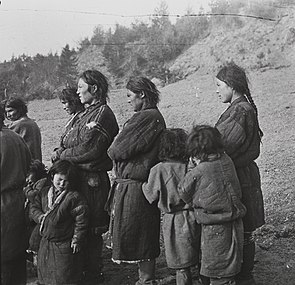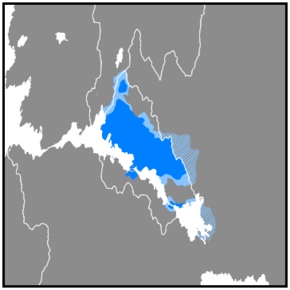Mokha language
This article is incomplete because it is pending further input from participants, or it is a work-in-progress by one author. Please comment on this article's talk page to share your input, comments and questions. Note: To contribute to this article, you may need to seek help from the author(s) of this page. |
| Mokha | |
|---|---|
| Mokhavic, Mokhavian, Nanay | |
| - | |
 Mokha people neer the city of Dene circa 1915 | |
| Pronunciation | /-/ |
| Native to | |
| Ethnicity | Mokhavics |
Native speakers | L1: 3,650,000 L2: 1,520,000 |
Unduk
| |
Standard forms | Coastal
|
| Dialects |
|
| Latin alphabet, Cyrillic alphabet | |
| Official status | |
Official language in | |
| Language codes | |
| ISO 639-1 | MK |
| ISO 639-2 | MKH |
| ISO 639-3 | MKH |
 Distribution of the language
Absolute majority >30% of native speakers | |
The Mokha language (Mokha: -) is the language of the Mokha people (aka: Mokhavic/Mokhavian/Nanay people), spoken on the coasts and inland of the Unduk lakes in Mokhavia, mainly the Nanay and Monay lakes. It's one of the indeginous languages spoken on the continent of Argis. It's the official working langauge of the nation of Mokhavia, spoken in the majority of the country.
Classification
Mokha is one of only 2 remaining members of the Unduk language family, the Unduk languages are a sub Paleo-Canamo language group. Most other Unduk languages went extinct by assimilation from people like the Ateenians, Haydag and even other Unduk tribes. The closest living language to Mokha, and also the only other Unduk language is the Seykel language, some linguist group them thoghether into one language due to their great similarity. The language map shown in the infobox includes areas of Seykel.
- Proto-Unduk
- Northern
- Nanaic
- Seykel language*
- Mokha language
- Monaic
- Aarnuaq language†
- Nanaic
- Southern
- Yakrow language†
- Duwat language†
- Northern
† - extinct language
Geographic Distribution
TBA
History
TBA
Phonology & Orthography
Consonants
| Labial | Alveolar | Post- Alveolar |
Palatal | Velar | Uvular | |||||||
|---|---|---|---|---|---|---|---|---|---|---|---|---|
| Plain | Long | Plain | Long | Plain | Long | Plain | Long | Plain | Long | Plain | Long | |
| Nasal | m [m] | mm [mː] | n [n] | nn [nː] | ||||||||
| Plosive | p [p] | pp [pː] | t [t] | tt [tː] | k̠ [c] | k̠k̠ [cː] | k [k] | kk [kː] | q [q] | qq [qː] | ||
| Affricate | ts [t͡s] | tts [t͡sː] | ts̠ [t͡s̙] | tts̠ [t͡s̙ː] | ||||||||
| Fricative | v [v] | vv [vː] | s [s] | ss [sː] | s̠ [s̙] | s̠s̠ [s̙ː] | h [x] | hh [xː] | ||||
| Aproximant | w [w] | l [l] | ll [lː] | j [j] | ||||||||
| Tap/Flap | r [ɾ] | |||||||||||
Vowels
| Front | Central | Back | |||||
|---|---|---|---|---|---|---|---|
| unrounded | unrounded | unrounded | rounded | ||||
| short | long | short | short | long | short | long | |
| Close | i [i] | ii [iː] | y [ɪ̈] | u [u] | uu [uː] | ||
| Open-mid | e [ɛ] | ee [ɛː] | o [ɔ] | oo [ɔː] | |||
| Open | ä [æ] | ää [æː] | a [ɑ] | a [ɑː] | |||
Grammar
TBA
Syntax
Nouns
TBA
Number
TBA
Articles
TBA
Cases
TBA
Adjectives
TBA
Pronouns
TBA
Verbs
TBA
Tenses/Aspect/Moods
TBA
Person & Direction
TBA
Adverbs
TBA
Other features
TBA
Questions
TBA
Miscellaneous
TBA
Dialects
TBA
Lexicon
TBA
Language Examples
TBA
- ↑ Seykel is disputed to weather it's a separate language or a developed dialect.